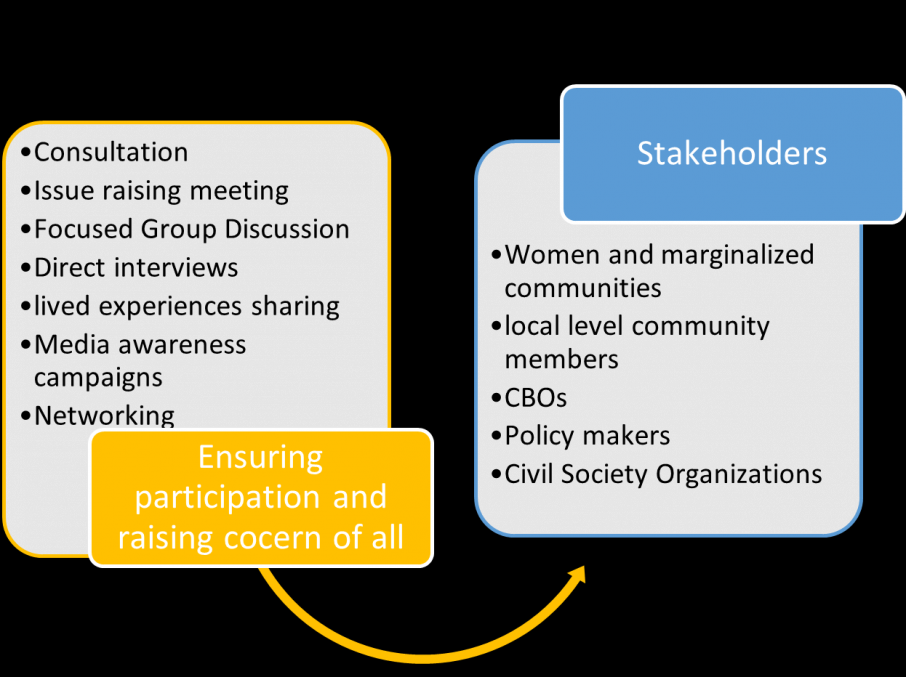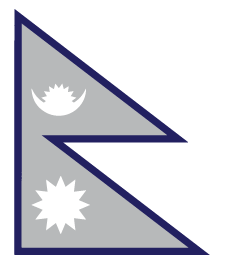Feminist Leadership best practices - BLAST

Case Study : BLAST
General Context
BLAST, a legal service organization situated in Bangladesh not only raises its voice against the discrimination against women but also combats liberally against all kind of irregularities that exists in the society. BLAST has gained proven expertise in providing legal aid to the disadvantaged and marginalized people. The organization regularly undertakes awareness programs, on various legal issues for the members of its community. The organization which has been working for access to justice uses practice frameworks such as Public Interest Litigation which are women-centered and situates women’s experiences within a broader context of gender and power.

The vision of the organization clearly illustrates the transformation they seek through their work such as activism and advocacy which challenges the social, political, economic and legal structures that oppress women and other diverse gender. They have various projects such as Legal Reform for ending corporal punishment, access to justice for realization of human rights and advocacy of the poor, increasing participation of women in establishing their rights, legal empowerment of gender diverse communities, expanding participation of people with disabilities, their diverse nature of work reflects their dedication in making an impact on the life of diverse target groups. Through seminars, issue based meetings with NGO representatives, judges, lawyers and the media, awareness session with the community and target group, training, conducting public interest litigation, collaboration with the government and other non-government organizations BLAST works to redress fundamental differences in power or structural inequities that exist on the basis of gender.
Advocacy Agenda Setting
Agenda
The main advocacy agenda carried by BLAST is to address discriminatory laws and practices, activate existing laws and judgments, seek law and policy reforms and institutional changes. They strongly believe that their agenda works for the transformation of the discriminatory social norms/ behavior/ practice. As per their agenda they are certain that they address majority of the gender discriminatory laws, acts, rules and regulations and propose to amend/reform/omit those discriminatory provisions. Through seminar, training and awareness session BLAST tries to raise awareness of the target group regarding both of their constitutional rights and fundamental rights. While some of their advocacy agendas strategies are planned beforehand, around core issues of concern that are specific to their local context, they themselves appreciate that the contexts are always changing. They recognize the ways in which injustices and inequalities might be different in certain communities, and might also intersect for girls, women, gender-non-conforming individuals and any other person across marginalized communities. They understand that holistic advocacy for the protection of human rights through promoting equality, access to justice and non-discrimination must be aligned with global advocacy efforts, global feminist agendas and international human rights practices. BLAST takes all of the aforementioned into account when designing and reviewing their advocacy agenda, to reflect shifting global strategies and perceptions, but also to ensure that their advocacy initiatives are able to best support their community members to exercise their rights. Hence, they believe to have seen a clear reflection of the multiple and shifting conditions of their advocacy agenda to their society and impact of global feminist agendas.
Participation and Representation
In terms of setting the agenda for advocacy, the advocacy and communication team designs the overall the agenda through a participatory way sharing with research and legal cell. During the time of setting the agenda they put importance upon the consultation with women and marginalized communities and proper incorporation of their views and experiences which BLAST derives from those consultations. To ensure the participation of women and marginalized communities in setting the agenda, they conduct issue-raising meetings and consultations with community members at local level, including representatives of various Community-Based Organisations (CBOs), to listen to their lived experiences and identify the key areas of concern and opportunities for advocacy. They also conduct FGDs and direct interviews with women and members of other marginalised communities subjected to rights violations, and have also conducted fact-finding missions. Likewise they hold consultations with government departments on key areas of law, policy and institutional reforms, and involve NGOs, civil society representatives and community representatives in the consultations to ensure concerns are raised with the appropriate stakeholders and the issues can be addressed.
Rather than just a physical participation, BLAST provides a platform of sharing their opinion which is taken into consideration at the time of formulating the agenda. They believe that a motivated and efficient leadership is the pre-requisite to leading the process of agenda setting. They conduct interaction with the women and other marginalized and non-binary genders as well as issue based seminar, training, awareness session, disseminate information through radio show, booklet, facebook, media coverage, official website for ensuring their participation. According to BLAST the meetings usually take place on a monthly, quarterly, half-yearly and yearly basis, in their official meeting room/ community’s preferred area/ rented auditorium, and taking the pandemic context into consideration through online video-conferencing platforms. They believe to have ensured the engagement of women from disadvantaged groups, like Dalit, ethnic communities, gender minorities through building networks and collaborating with NGOs and right based organisations directly working to eliminate exclusion of and discrimination against these communities and advocate for their rights. They have observed a positive change or transformation in power relation between and among diverse groups due to the encouragement of their participation. Due to which participation the diverse groups became aware about their constitutional and fundamental rights for which they are entitled as a citizen and also as a human being.
Strategies for mobilizing and collectivizing
Strategies
- Issue based seminars, meetings, capacity building trainings, sharing of lessons/experiences/challenges/best practices, media advocacy awareness sessions (including through radio shows), are some of the major strategies that have been taken to build the added strength. Yes, we think these strategies have entirely supported mobilizing women and marginalized communities for advocacy activities. All of our strategies – issue based seminar, meeting, training, lesson/experience sharing meeting, awareness session are properly worked for mobilizing and collectivizing. We, through our website, media coverage, issue based radio show and Facebook try to adequately informed women about the processes and opportunities related to advocacy, its strategies and impact on their lives. Lack of awareness, non-secured environment, illiteracy, poverty, reluctance, family and social barrier curtails them to be part of advocacy and its process. Yes, we have been adopted the strategies for organizing and collectivizing able to bring new condition in society and in the communities. These strategies aid to bring a positive transformation in the perspective of the society towards women. Yes, all the strategies adopted were non-violent and peaceful.
Role of Different actors
BLAST ensures that new coalition/network have been formed, such as: Right Here Right Now (RHRN: Gender Diversity), Rape Law Reform Coalition (RLRC)” 2020, Empowering left behind minority communities to effectively participate in the development process of Bangladesh (ELM) etc. They believe that all of the formed coalition are effective as the main object of the projects are to ensure equality and eliminate discrimination in marginalized community of their country. Lawyers, academics, researchers, trainers, legal facilitators, paralegals, advocacy officers and other expert staff are involved in advocacy activities. The whole advocacy team works together to achieve organisational goals and advocacy agendas. The advocacy team is responsible, firstly, for identifying emerging and contemporary advocacy issues, areas of discrimination (in law/policy/practice and within other social structures), and any incidents of human rights violations – this is done by the team through communication and engagement with various organisational partners and networks, reports and findings from other relevant teams within the organisation (e.g. Legal, Research, and project teams), review of offline and online media reports, and through follow-up on updates of previous or ongoing advocacy initiatives. The team then builds awareness on the above amongst marginalised communities and relevant stakeholders through seminars, capacity building trainings (e.g. on feminist legal theory and practice - in organizing these, the advocacy team collaborates with the Training team and other relevant departments), radio shows, and awareness-raising meetings. The team also works with the Legal Team to ensure legal interventions with regard to human rights violations and to bring the issues to the attention of the courts, and disseminates court rulings, directions and guidelines through press releases / publications (e.g. information booklets), Facebook posts / radio show episodes / messaging on the organisation’s official website. The team also liaises with relevant govt. authorities and non-govt organisations on core advocacy issues by sharing recommendations for reforms, findings of research, and working together to design better policies, and also advocates with these organisations for the proper implementation of laws and court judgments. BLAST clarifies that the actors involved were highly interested in the transformation and change by eliminating oppressive patriarchal structure and practice that devalue girls and women in all their diverse identities as born or by choice. The actors rigorously and extensively engaged in the advocacy through their experience and expert knowledge, training try to raise awareness among the challenges and obstacles in the way of enjoying the fundamental rights.
Gender Roles
The trend of women’s engagement in the collectivizing and organizing is emphasized upon the freedom of expression, freedom of thought, conscience and of speech, right to health, freedom of movement, right to choice, equal opportunity in the service sector, enjoy all the fundamental and constitutional rights without any discrimination. With the acquired strategies significant and successful changes in the condition and position of women in the society was observed. The men of Bangladesh has not been seen so progressive towards women’s engagement in the advocacy, however gradual positive change in perception could be observed of everyone towards the women engagement in the advocacy. The advocacy strategies have been very helpful in improving women’s mobility outside the house in the community.
Leadership
Leadership in BLAST is observed as an art and practice of motivating a group of people in order to achieve a common goal. Yes, they stood for inclusive, equitable governance structure of network/ coalitions that foster fair and equal treatment of girls, women and other disenfranchised groups in their diverse identities. When BLAST identifies any specific areas of injustice, or incidents of rights violations – where girls, women and individuals in other marginalized groups are facing injustice, inequality, irregularities and discrimination in every sphere of their lives, they protest these unlawful and unconstitutional activities, and at the same time, they design advocacy campaigns or initiatives to raise awareness against such rights violations, promote inclusion and equality, and build dialogue around the need non-discriminatory access to information and services to be able to exercise rights, and we also empower members of these marginalised communities to speak up against the violations and seek justice and remedies, through educating them on their legal, Constitutional and fundamental rights as citizens and as human beings, setting up spaces for them to raise concerns with stakeholders, and connecting them to services. Well-organized optimistic leadership has played a positive role in creating spaces that can inspire feminist organizations and their roles in the women’s advocacy activities. BLAST is committed to building the capacity of other feminist organisations through networking and collaboration and they have always created a preeminent place for new generation who are fascinated and determined to take leadership. The young feminists are usually invited to attend in most of their events and are encouraged to share their view, experience, interest so that everyone can realize exact what young generation’s thought regarding their rights and what obstacle they face in enjoying their rights.
Latest Comments
Upcoming Events
Editor's Pick
- Emergence and Practice of Feminist Knowledge in Nepal General
- Walls Turned Sideways Are Bridges Reports
- No Justice without Reparation: Why Rape Survivors Must Have a Right to Compensation General
- Child Marriage Prosecutions in India - Case Law Analysis of Actors, Motives and Outcomes 2008-2017 General
- Feminist Leadership best practices - Sangat Best Practices



